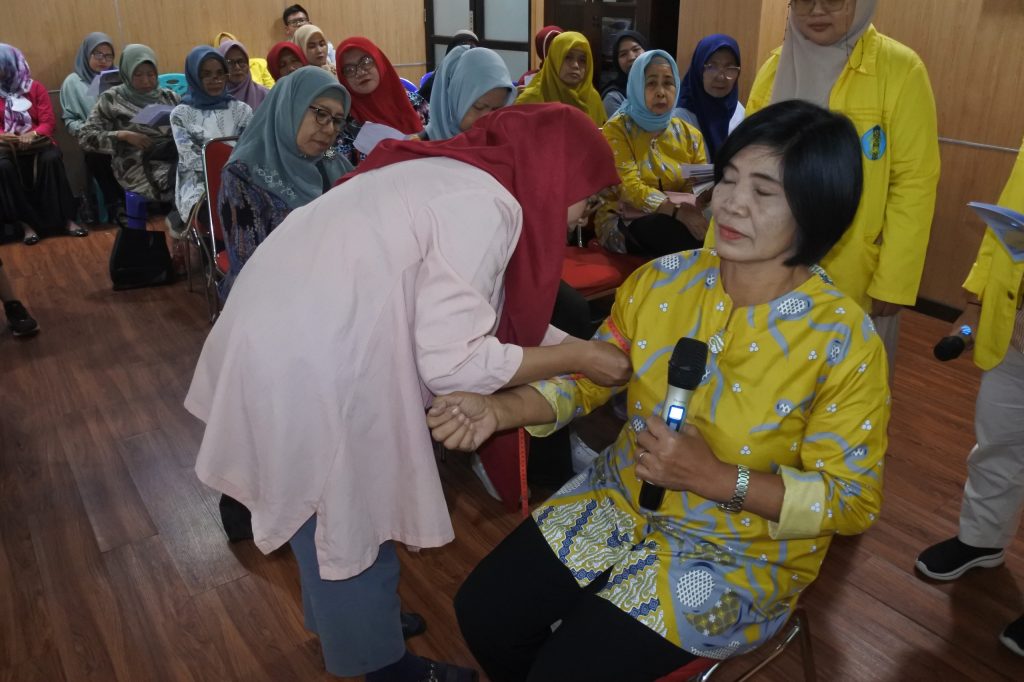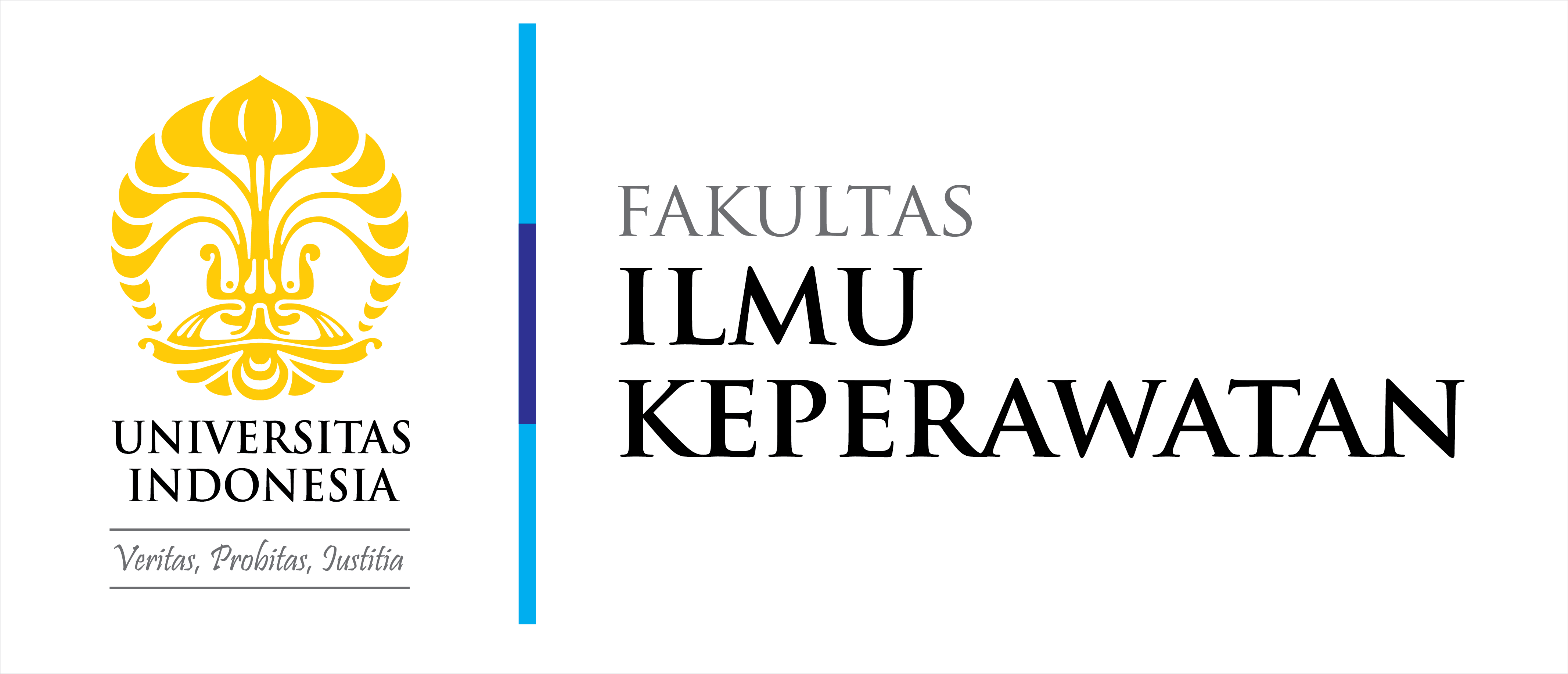
In an effort to support capacity building for elderly health services, the Faculty of Nursing Sciences, University of Indonesia (FoN UI) organized a community service activity in the form of ICOPE (Integrated Care for Older People) Based Simple Elderly Health Screening Training (SKILAS). The training, which was held on Wednesday, September 4, 2024, at Puskesmas Pulogadung District, East Jakarta, was attended by 75 Posyandu cadres and health workers. The activity aimed to equip the cadres with the knowledge and practical skills needed to conduct more effective and integrated elderly health screening. With the holistic approach developed by WHO through the ICOPE program, it is hoped that Posyandu cadres can play a greater role in maintaining the quality of life of the elderly in their environment.
The ICOPE approach on which this training is based is part of WHO's global strategy to support healthy aging. The program is designed to prevent the decline of older people's functional capacity, which includes cognition, mobility, nutrition, vision, hearing and mental health. WHO recognizes that the world's elderly population is growing and with it comes new health challenges. Therefore, elderly care no longer focuses only on the treatment of disease, but also on maintaining functional abilities so that the elderly can continue to actively participate in daily life.
Dr. Kuntarti, S.Kp., M.Biomed, selaku Ketua Tim Pengabdi, menjelaskan pentingnya penerapan ICOPE di komunitas. “Pelatihan ini bertujuan untuk meningkatkan pemahaman kader Posyandu tentang pentingnya deteksi dini masalah kesehatan pada lansia. Melalui pendekatan ICOPE, kader tidak hanya dilatih untuk mengidentifikasi gejala-gejala penurunan fungsi pada lansia, tetapi juga diajarkan bagaimana menilai masalah pada lansia, sehingga dapat merekomendasikan kebutuhan perawatan lebih lanjut,” jelasnya. Ia menambahkan bahwa pelatihan ini diharapkan dapat meningkatkan kualitas layanan kesehatan di tingkat
primer, sehingga lansia dapat memperoleh perawatan yang lebih baik dan tepat sasaran.
ICOPE is one of the revolutionary steps initiated by WHO to ensure that the elderly receive integrated, person-centered care and community-based care. With the increasing number of elderly people in various countries, including in Indonesia, their health challenges are becoming increasingly complex.
Traditional approaches that only focus on managing acute illnesses are now considered insufficient. The elderly often face a range of interrelated health problems, such as decreased mobility, malnutrition, depression and declining cognitive function. Therefore, ICOPE emphasizes prevention and comprehensive care to support older adults to remain independent.
At this training at Puskesmas Pulogadung, Posyandu cadres received material on SKILAS (Simple Elderly Health Screening) to identify changes in six main functions that need to be monitored in the elderly, namely:
1. Cognitive Capacity - Identify the decline in memory and thinking ability of older adults.
2. Mobility - Measures ability to move and physical activity.
3. Nutrition - Detect the risk of malnutrition or poor nutrition.
4. Vision - Assess the quality of vision which often declines with age.
5. Hearing - Identify hearing loss.
6. Mental health - Measure potential depressive symptoms that often go undetected in the elderly.
In addition, the cadres also received education on four common health problems in the elderly, namely Low Back Pain, Heart Disease, Diabetes Mellitus, and Hypertension. Not only were they provided with theory, but they were also involved in simulations and practical exercises to ensure that they can apply this SKILAS screening directly in the field. With this capability, Posyandu cadres are expected to be able to provide early intervention before the health condition of the elderly deteriorates, as well as direct them to get further health services if needed.
Mrs. Marnati, one of the Posyandu cadres from RW 10 Kelurahan Jati who participated in the training, shared her experience, “This training is very useful, not only for Posyandu activities, but also for our own family health. I know how to detect health problems that are often experienced by the elderly. I hope I can use this knowledge to help more people around me.” Marniati demonstrates the importance of community-based training such as that conducted by FIK UI, in helping to strengthen the role of cadres in elderly care.
Plh. Dean of FIK UI, Dessie Wanda, S.Kp., M.N., Ph.D, conveyed the importance of community-based elderly care and the holistic approach promoted by ICOPE. “We at FIK UI are well aware of the challenges faced by the community in caring for the elderly. Therefore, we are committed to continue supporting the capacity building of Posyandu cadres and health workers at the community level, so that they can provide the best and integrated care. ICOPE is one approach that is very much in line with the nursing values that we uphold at FIK UI, which is caring for the whole person - not only physically, but also mentally and socially,” said Dessie Wanda.
Dessie also emphasized that collaboration with various parties is very important to achieve optimal results in improving health services for the elderly. This training is not only proof of FIK UI's real contribution in caring for the nation, but also a place for collaboration between academics, health workers, and local governments. Through this synergy, FIK UI hopes that training such as ICOPE-based SKILAS can continue to be carried out in various other regions, so that more and more elderly people get proper care.
This activity was made possible with the support of the Directorate of Research and Community Service of the University of Indonesia (DRPM UI) and in collaboration with the DKI Jakarta Health Office, the East Jakarta Health Office, and the Pulogadung District Health Center. This support shows that increasing the capacity of elderly health services at the community level is a shared priority that requires the involvement of many parties.
Head of Administration at Puskesmas Pulogadung, Mr. Yuddy, SKM, expressed his gratitude to FIK UI for their contribution. “We are very grateful for the implementation of this training. Hopefully, the cadres who have attended this training can be more concerned about the health of the elderly and can help increase the awareness of the elderly in our area to routinely check their health.”
The ICOPE-based SKILAS training is one example of how WHO's global approach can be applied locally and have a direct impact in the community. With the increasing elderly population in Indonesia, initiatives like this are becoming increasingly relevant and important to ensure that every elderly person can live a healthy, active and dignified old age.
FIK UI, through its community service programs, is committed to continuing to support the capacity building of Posyandu cadres and health workers throughout Indonesia, in order to achieve better and quality elderly health services.

Gedung A Lantai 2, Rumpun Ilmu Kesehatan (RIK), Kampus UI Depok,
Jl. Prof. Dr. Bahder Djohan, Kampus UI Depok, Pondok Cina, Kecamatan Beji, Kota Depok, Jawa Barat 16424, Indonesia.
Jl. Prof. DR. Sudjono D. Pusponegoro, Kampus UI Depok, Pondok Cina, Kecamatan Beji, Kota Depok,
Jawa Barat 16424, Indonesia.